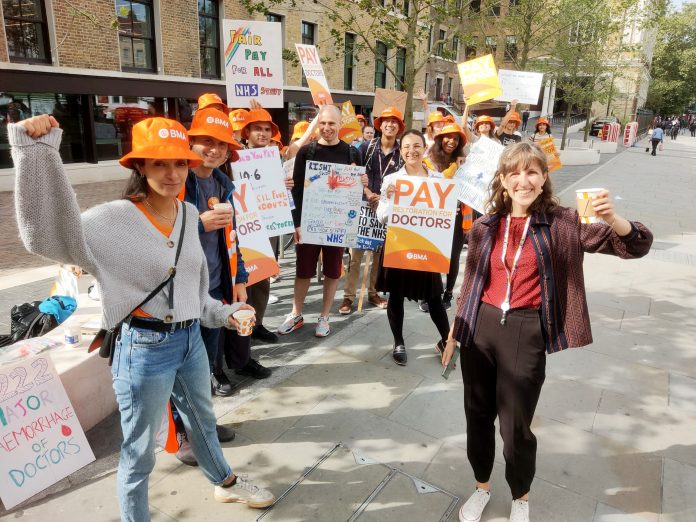Hospital consultants in the BMA will go on a second 48-hour strike on 24 and 25 August.
Junior doctors struck from 11–15 August, and are currently reballoting, a requirement of the Tories’ undemocratic anti-union laws.
‘A jumbo jet’s worth of needless deaths each week’
Dr Tal Ellenbogen, East Midlands BMA representative, spoke to Leicester Socialist Party members.
Doctors have faced a 31.7% real-terms pay cut since 2008. It effectively means that doctors are working as much as four months a year for free. Yet we are not seeing 31% fewer patients, we’re not doing 31% less work.
We often have to cover for two or three doctors because so many are leaving due to these pay cuts. We struggle to give patients the quality of care that they deserve in a timely fashion.
We now have 21,000 more members compared to when we last balloted in January – a 50% increase. That makes us one of the most unionised professions, at over 90% of junior doctors. We’re asking for those 90% to vote ‘yes’, to continue striking for pay restoration.
We had another pay cut imposed on us. The average 8.8% uplift is still less than the 11.4% rate of inflation. And it does nothing to put a dent in the last 14 years of real-terms cuts. We aim to get Rishi Sunak back to the table. And therefore, with a new mandate, we will continue striking through the autumn, the winter and beyond, if need be.
No doctor wants to go on strike, but when we have a prime minister that appears to be intent on burying his head in the sand until the next election, we have been left with no choice. Last winter, 500 people a week – a whole jumbo jet’s worth – died in A&Es needlessly due to a lack of staff. If an airline had a jumbo jet go down every week, people would expect serious action.
‘Privatisation kills’
Junior doctors spoke to Reading Socialist Party members.
Thousands of NHS services are now run by non-NHS providers, and the links between 88 of our MPs (that are known) and the private healthcare industry is shocking. MPs are meant to declare their interests. But a loophole, or a murky underbelly, in the whole registration system of ‘unincorporated associations’, means that these ‘associates’ do not have to provide any public information.
Privatisation harms patients. Research by the University of Oxford published in the Lancet found conclusively that “private sector outsourcing corresponded with significantly increased rates of treatable mortality”. It also impacts sustainable long-term relationships between properly-supported NHS staff and their patients.
The figures for what is spent by the NHS on for-profit organisations to run services are eye-watering. Private hospitals, private units within NHS hospitals, private GP services, private specialist clinicts, private care homes. £92 million was spent in 2019 on private ambulances and taxis!
The government could provide the NHS with more resources so that it can train and employ more staff to provide a not-for-profit service for patients. It is in the interests of private companies – such as these who donate to MPs – that they don’t. If funded properly, the NHS could provide services such as IT, recruitment, laboratories, diagnostics and pathology, cleaning, catering, maintenance etc.
Shareholders shouldn’t be part of our public healthcare and private companies should not be skimming a profit from the NHS. Do we really want to end up with a US-style private healthcare system, where every year thousands of people lose their homes, suffer and die because they can’t afford medication or medical insurance?
The private companies are interested in only one thing – profit! They see the NHS as a massive money-making machine, not as the greatest social achievement of the 20th century, where people are treated equally, regardless of wealth. We must stand up and fight for it!







